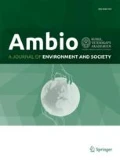Abstract
This study investigates the influence of knowledge on opinions about climate change in the emerging adults’ age group (16–17 years). Furthermore, the effects of a lecture in climate change science on knowledge and opinions were assessed. A survey was conducted in Austria and Denmark on 188 students in national and international schools before and after a lecture in climate change science. The results show that knowledge about climate change science significantly affects opinions about climate change. Students with a higher number of correct answers are more likely to have the opinion that humans are causing climate change and that both individuals and governments are responsible for addressing climate change. The lecture in climate change science significantly improved knowledge development but did not affect opinions. Knowledge was improved by 11 % after the lecture. However, the percentage of correct answers was still below 60 % indicating an urgent need for improving climate change science education.
References
Adger, W., J. Barnett, F. Chapin III, and H. Ellemor. 2011. This must be the place: Underrepresentation of identity and meaning in climate change decision-making. Global Environmental Politics 11: 1–25.
Agarwal, B. 1992. The gender and the environment debate: Lessons from India. Feminist Studies 18: 119–158.
Andersson, B., and A. Wallin. 2000. Students’ understanding of the greenhouse effect, societal consequences of reducing CO2 emissions and why ozone layer depletion is a problem. Journal of Research in Science Teaching 37: 1096–1111.
Bord, R., and R. O’Connor. 1997. The gender gap in environmental attitudes: The case of perceived vulnerability of risk. Social Science Quarterly 78: 830–840.
Boyes, E., M. Stanisstreet, and B. Daniel. 2004. High school students’ beliefs about the extent to which actions might reduce global warming. San Francisco, Liverpool: Environmental Education Research Unit, University of Liverpool.
Bradley, J., T. Waliczek, and J. Zajicek. 1999. Relationship between environmental knowledge and environmental attitude of high school students. Journal of Environmental Education 30: 17.
Cameron, T. 2002. Updating subjective risks in the presence of conflicting information: An application to climate change. Journal of Risk and Uncertainty 30: 63–97.
Carson, R. 1962. Silent spring, 1st ed. New York, New York: Houghton Mifflin.
Fortner, R. 2001. Climate change in school: Where does it fit and how ready are we? Canadian Journal of Environmental Education 6: 18–31.
Hines, J., H. Hungerford, and A. Tomera. 2010. Analysis and synthesis of research on responsible environmental behavior: A meta-analysis. The Journal of Environmental Education 18: 1–8.
Hobson, A. 2001. Teaching relevant science for scientific literacy. Journal of College Science Teaching 30: 238–243.
Hoffman, M. 1977. Sex differences in empathy and related behaviors. Psychological Bulletin 84: 712–722.
Kempton, W. 1993. Will public environmental concern lead to action on global warming? Annual Review of Energy and the Environment 18: 217–245.
Læssøe, J., K. Schnack, S. Breiting, and S. Rolls. 2009. Climate change and sustainable development: The response from education. Aarhus: International Alliance of Leading Educational Institutions.
Lewis, J., and J. Leach. 2006. Discussion of socio-scientific issues: The role of science knowledge. International Journal of Science Education 28: 1267–1287.
Lorenzoni, I., and N. Pidgeon. 2006. Public views on climate change: European and USA perspectives. Climatic Change 77: 73–95.
McBean, G., and H. Hengeveld. 2000. Communicating the science of climate change: A mutual challenge for scientists and educators. Canadian Journal of Environmental Education 5: Spring, 9–23.
McCright, A. 2010. The effects of gender on climate change knowledge and concern in the American public. Population and Environment 32: 66–87.
Naustdalslid, J. 2011. Climate change—the challenge of translating scientific knowledge into action. International Journal of Sustainable Development & World Ecology 18: 243–252.
Pruneau, D., U. Moncton, L. Liboirin, E. Vrain, H. Gravel, W. Bourque, and J. Langis. 2001. People’s ideas about climate change: A source of inspiration for the creation of educational programs. Canadian Journal of Environmental Education 6: Spring, 121–138.
Rauch, F. 2002. The potential of education for sustainable development for reform in schools. Environmental Education Research 8: 43–51.
Robinson, K. 2001, 2011. Out of our minds: Learning to be creative. Chichester: Capstone Publishing Ltd.
Rye, J., P. Rubba, and R. Wiesenmayer. 1997. An investigation of middle school students’ alternative conceptions of global warming. International Journal of Science Education 19: 527–551.
Simons, H., and J. Hicks. 2006. Opening doors: Using the creative arts in learning and teaching. Arts and Humanities in Higher Education 5: 77–90.
Solomon, S., D. Qin, M. Manning, Z. Chen, M. Marquis, K.B. Averyt, M. Tignor, and H.L. Miller. 2007. IPCC, 2007: Climate change 2007: The physical science basis. Contribution of working group I to the fourth assessment report of the Intergovernmental Panel on Climate Change, 996 pp. Cambridge: Cambridge University Press.
Sunstein, C. 2006. The availability heuristic, intuitive cost-benefit analysis and climate change. Climatic Change 77: 195–210.
Tjernström, E., and T. Tietenberg. 2008. Do differences in attitudes explain differences in national climate policies? Ecological Economics 65: 315–324.
Venville, G., and V. Dawson. 2010. The impact of a classroom intervention on grade 10 students’ argumentation skills, informal reasoning, and conceptual understanding of science. Journal of Research in Science Teaching 47: 952–977.
Weingart, P., A. Engels, and P. Pansegrau. 2000. Risks of communication: Discourses on climate change in science, politics, and the mass media. Public Understanding of Science 9: 261–283.
Yencken, D., J. Fien, and H. Sykes. 2000. Environment, education and society in the Asia-Pacific: Local traditions and global discourses, 240 pp. London: Routledge Advances in Asia-Pacific Studies.
Zoller, U. 2012. Science education for global sustainability: What is necessary for teaching, learning, and assessment strategies? Journal of Chemical Education 89: 297–300.
Acknowledgments
We wish to thank: Dr John Roy Porter, Eskild Hohlmann Bennetzen, Dr Helga Kromp-Kolb.
Author information
Authors and Affiliations
Corresponding author
Electronic supplementary material
Below is the link to the electronic supplementary material.
Rights and permissions
About this article
Cite this article
Harker-Schuch, I., Bugge-Henriksen, C. Opinions and Knowledge About Climate Change Science in High School Students. AMBIO 42, 755–766 (2013). https://doi.org/10.1007/s13280-013-0388-4
Received:
Revised:
Accepted:
Published:
Issue Date:
DOI: https://doi.org/10.1007/s13280-013-0388-4

